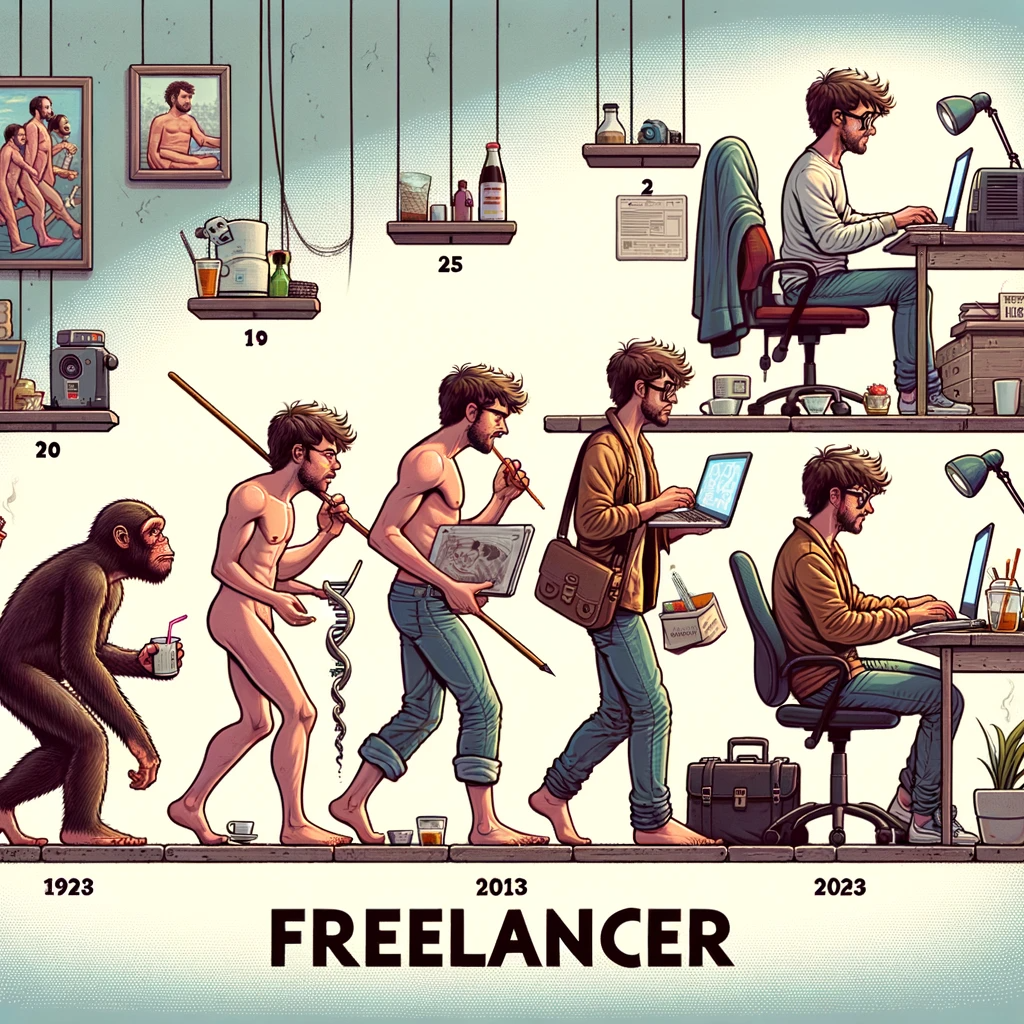From its roots in the late 1900s to becoming a career choice for many today, the freelancer’s journey through time is nothing short of remarkable. We examine the social movement and the giants taking on the market: lately, it’s been Upwork vs. Fiverr for gig economy workers. Yet amidst their meteoric rises, issues prevail for freelancers worldwide, especially when the collaboration requires a more personalized touch. No sweat, Vouch is on the way.
From Hobby to Hustle: The Evolution of Freelancing
In the late 1900s, when corporate work was glorified by most, freelancing was often seen as a side gig or a last resort, primarily reserved for journalists, artists, and a few tech professionals. This perception was largely because of the lack of structured platforms and the inherent risks of self-employment without the internet.
Publications and companies would often scout for talent through traditional printed ads or word-of-mouth. It was a time when sites like Craigslist began to dip their toes into the freelance market, offering a rudimentary form of connection between employers and freelancers.
By the early 2000s, the rise of the internet and remote working tools began to reshape this perception, gradually positioning freelancing as a viable career choice thanks to increase accessibility. With platforms like Upwork (formerly Elance-oDesk) entering the scene, the freelance marketplace started to gain structure.
The Landscape Today: Digitalization of the Freelancer
Today's freelancing landscape is incredibly diverse. Platforms such as Fiverr and Upwork support thousands of job categories, allowing for a wide range of unique skills to be showcased. Whether you're a voice-over artist, a digital marketer, or even a tarot card reader, there's likely a gig for you.
Data indicates that over 73 million Americans freelanced in some capacity in 2023 (roughly 1 in every 5 Americans).
This number is expected to rise, given the push towards remote work and the appeal of flexible schedules, especially in a post-COVID environment.
The rise of professional content creation on platforms like TikTok and YouTube has further expanded the freelance sphere. These platforms not only allow creatives to showcase their work but also monetize their content, blurring the lines between traditional employment and freelancing.
These trends have catapulted freelancing from a business-to-consumer (B2C) business model to a peer-to-peer model that underpins the social networks dominating the internet today.
The Battle of Giants – Upwork vs Fiverr
While both Upwork and Fiverr are titans in the freelance marketplace space, they cater to slightly different audiences. Upwork leans more towards long-term projects and specialized professionals, while Fiverr caters to one-off gigs and more diverse skill sets.
According to Statista, as of 2021, Upwork has reported over $2.5 billion in annual gross services volume, while Fiverr reported around $820 million. These figures underscore the massive demand for freelance services and the intense competition between the platforms, without even accounting for gigs facilitated via word-of-mouth.
For example, our proprietary user research tells us that 80%+ of creative gigs are facilitated by word-of-mouth today.
Although both Upwork and Fiverr offer access to flexible and less costly labor from foreign and domestic sectors, the quality of service remains questionable and difficult to vet: most individuals using the platform as a source of business leads look to execute the minimum baseline of work to fulfill client needs, leading to user and service demand drop offs.
Additionally, our research tells us that these platforms foster hyper-competition and undercutting practices between freelancers going for the same gig. These platform characteristics discourage many freelancers from monetizing their passions and skills.
Bridging the Gaps: The Freelancing World's Challenges
The Freelancer's Plight:
- Despite the allure of being one's own boss, freelancers often grapple with challenges like inconsistent income, lack of health benefits, and no job security. The uncertainty of the next paycheck can be stressful for many.
- A study by Upwork showed that while 77% of full-time freelancers believe they're better equipped for the future than others, over 63% still feel anxious about the sporadic nature of freelance work. Generating consistent leads is essential to long-term lifestyle sustainability.
The Union Void:
- Traditional jobs often come with the protection of unions which fight for workers' rights. Freelancers, however, usually lack this luxury. There have been pushes for freelance unions in various parts of the world, but establishing them universally remains a challenge.
- This lack of unionized protection can lead to issues like payment disputes, contract disagreements, and an overall lack of a safety net for many freelancers. As it stands, the Freelancer’s Union in NYC is one of the few organizations working to consistently address these issues but it’s got a long way to go.
Existing Platform Limitations:
- While platforms like Upwork and Fiverr provide a structured marketplace, they also take significant cuts from freelancers' earnings. Fiverr, for instance, takes up to a 20% commission from each transaction.
- These platforms also control job visibility, pricing structures, and client interactions, often limiting the freelancer's autonomy. Moreover, it’s difficult to market and monetize skills that are independent of one’s professional resume (such as a passion, hobby, or lifelong side hustle).
- Ever had a friend in finance or tech that was randomly interested in stop motion but never took the dive to make it more than a hobby? We’re looking to empower these interests.
- Working with anons further complicates work, as some less-known clients seek to game the system and take value and time away from the freelancer.
Keeping Up the Momentum: How Vouch Fits in the Freelancing Evolution
With freelancing rapidly becoming the new standard for the future of work, it’s often hard to stop and reflect on the impact this historical movement has on human behaviors. Independent freelancers have pushed forth the agenda aggressively (gaining support every step of the way), but have had to sacrifice certain benefits to live self-guided lifestyles and to do what they love.
For one, we believe that people have been limited to chasing large amounts of positive reviews on digital marketplaces, limiting the ability for late movers or young entrants to make a name for themselves in order to have sustainable independent careers. Vouch leverages our users’ second degree networks to identify more trustworthy and aligned in-network leads for everyone. To make a peer-to-peer ecosystem work for its users, everyone needs to pitch in.
On the other hand, we know firsthand how valued time and money is to our users: paying a 20% commission to a centralized platform is not sustainable, especially when repeat work is common due to most individuals being motivated to perform the bare minimum to fulfill gigs. Offering 50%+ cheaper commission structures with aligned performance incentives makes Vouch the obvious choice for collaborative work.
What really gets to us though is that businesses such as Upwork and Fiverr are benefitting long-term from the freelancers’ business, but don’t offer this return of value back to their most devoted users. Vouch is here to change that. All business activities done on-platform are directly correlated to placement for premium features with increased earning potential and long-term rewards via our token airdrop. If you’re a power user deserving of a lot of tokens, you get to directly influence the strategy and direction of the app via the rewards we provide you.
Vouch leverages direct referrals for higher lead generation (for business and partnerships) with:
- Lower commission costs
- Interpersonal trust as an alignment tool
- Engagement lifecycle automation
- Long-term rewards for application use
Vouch is primed to shake-up the gig economy space and make the Upwork vs. Fiverr vs. Craigslist conversation moot. Our ecosystem empowers its users as it grows, making the independent freelancing path all the more sustainable in the long run.


